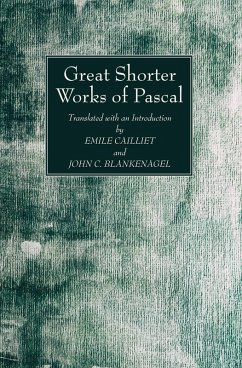The purpose in offering the Great Shorter Works is "to make essential classical Pascalian literature, other than the Provincial Letters and the Pensees, available to discriminating readers who might find the original texts difficult and discouraging." Preceded by a valuable introduction, forty-five letters are presented, beginning with a letter written when Pascal was a precocious twenty and ending with his will at thirty-eight. These remarkable letters, covering a nineteen-year period of intense activity, reflect the variety of Pascal's interests. For this reason, among others, they are of value, not only to those who are interested in Christianity, but also to those who are interested in physics, or mathematics, or philosophy. Blaise Pascal bequeathed to the world many tangible legacies, including the calculating machine, the barometer, the hydraulic press, and the omnibus. In his letters he has bequeathed that quality of mind and spirit which surpasses the tangible and illumines life.
Dieser Download kann aus rechtlichen Gründen nur mit Rechnungsadresse in A, D ausgeliefert werden.


